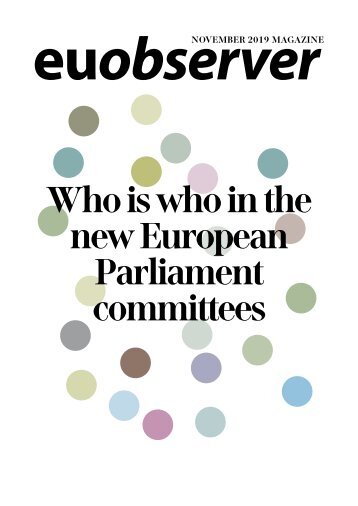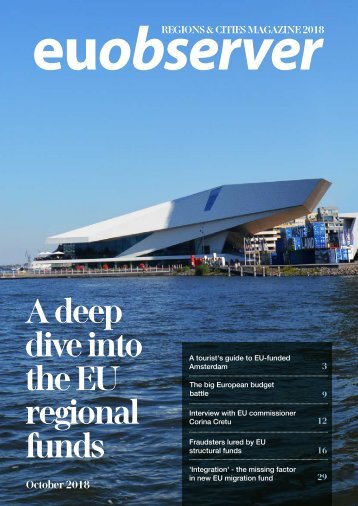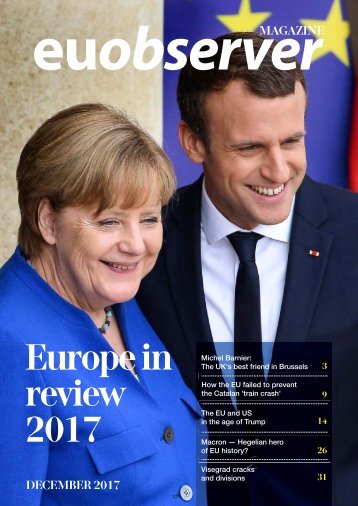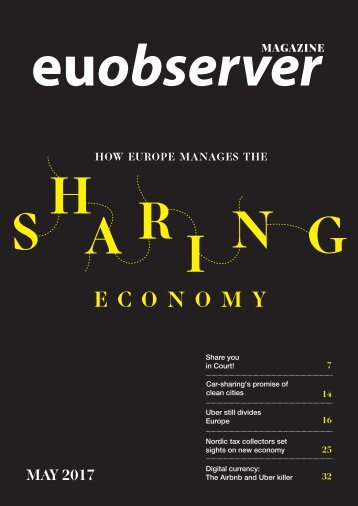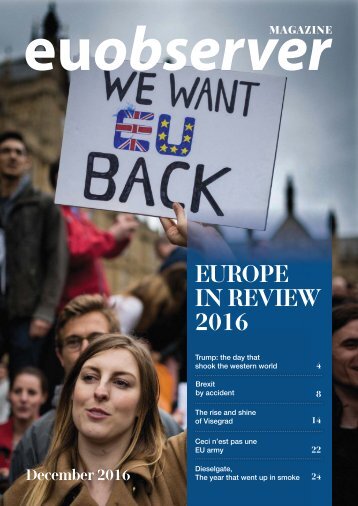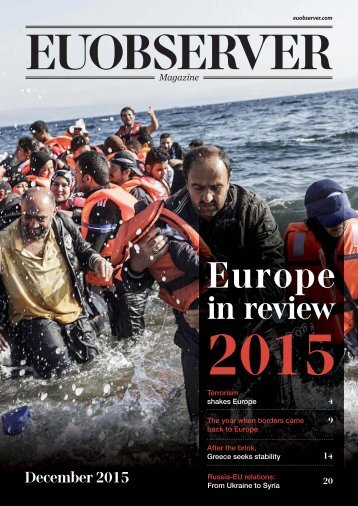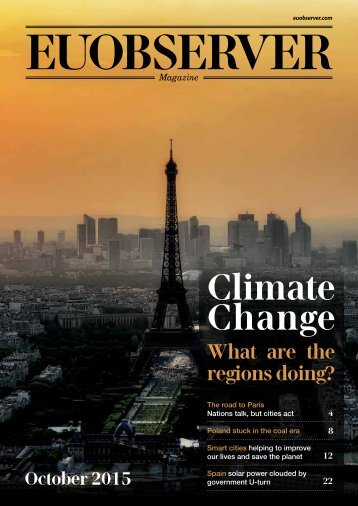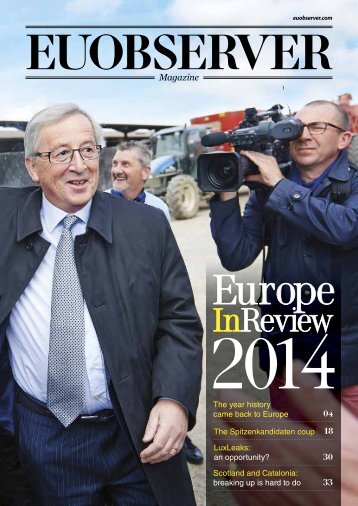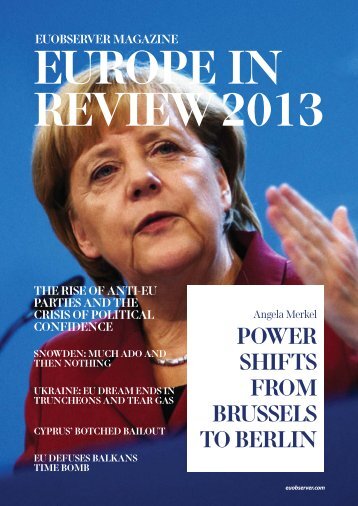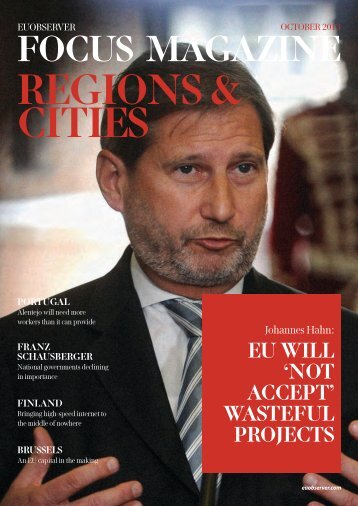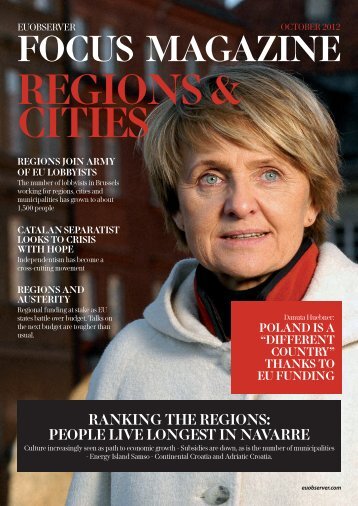Europe in Review 2014
- Text
- Terrorism
- Cameron
- Farage
- Ttip
- Romania
- Economy
- Ukraine
- Ukraine
- Catalonia
- Scotland
- Luxleaks
- Spitzenkandidaten
- European
- Juncker
- Parliament
- Euobserver
- Russia
- Brussels
- Democracy
- Elections
Birth of the Juncker
Birth of the Juncker commission Reasons for delay abounded: not enough women, an east-west row over the next foreign affairs chief and a Slovenian mini-drama. Still, the Juncker commission took office, as planned, on 1 November. By Valentina Pop Jean-Claude Juncker’s commission had a difficult birth. For several weeks over summer it was unclear whether it would be up and running by the 1 November deadline. A summit in July ended with EU leaders unable to decide on two top posts, amid an east-west row over Italy’s proposal to let its foreign minister, Federica Mogherini, represent the EU as foreign affairs chief. Eastern member states feared she was too Russia-friendly. Others still argued she did not have enough experience. In the end Mogherini was appointed to the post by EU leaders at the end of August. Easterners’ concerns were mollified by the fact that a Polish prime minister take up the second post on offer – President of the European Council. The top-posts debacle was linked to the forming of the commission because Mogherini would also become Italy’s commissioner. A novelty in the EU institutional set-up and only the second time to be tested, the foreign policy chief is also a member of the 28-strong college of commissioners, where each country has one representative. VICE-PRESIDENTS The delay in appointing Mogherini stalled the forming of the commission as many EU governments were reluctant to make a clear nomination until the foreign policy position had been tied down. In an interview with EUobserver early August, Juncker’s chief of staff Martin Selmayr spoke of “dozens” of models for the commission, as some countries were considering several names with different portfolios. And with several countries opting to send former prime ministers, finance or foreign ministers as their future commissioners, it was also a challenge to give everyone an important-enough portfolio. What Selmayr and Juncker came up with was a new system of seven “vice-presidents” who would serve as Juncker’s deputies and as “team leaders” co-ordinating the work of several commissioners within broader policy areas – including the economy, as well as digital and energy issues. JUNCKER’S RIGHT HAND MAN But out of the negotiations with the European Parliament it emerged that Juncker’s “right hand” man, former Dutch foreign minister Frans Timmermans, would have an impossibly large task. He is to oversee everything from the Charter of Fundamental Rights to cutting red tape, to sustainable development through to aspects of the ongoing EU-US free trade negotiations. Meanwhile other ‘regular’ commissioners, notably Germany’s Guenther Oettinger in charge of the digital single market questioned the authority of the vice-presidents and indicated he would not be taking orders from anyone. According to the EU treaty, commissioners are all equals - at least when it comes to voting in the College. But the new model would see the seven vice-presidents “filter” legislative proposals before they even get to a vote. While that is the thinking behind the model, much will depend on the personality of each commissioner. Forceful personalities who are clever at internal politics will likely be able to better make the case for legislation to be tabled. Timmermans will act as the ultimate decision-maker on any new laws as his brief is to rid the EU of unnecessary regulation. Jean-Claude Juncker, a former Luxembourg PM, was nominated by EU leaders after his centre-right party won the most votes in the European Parliament elections. Photo: European Commission MEPs voted in the Juncker commission on 24 October after a mini-drama over the Slovene commissioner and a struggle to get nine women commissioners. Alenka Bratusek -the former Slovene PM was the only one to fall through the EP hearings of commissioner-nominees. Photo: European Parliament Photo: European Parliament 22 ––––– Europe in review 2014 Europe in review 2014 ––––– 23
- Page 1 and 2: euobserver.com Magazine Europe 2014
- Page 4: The year history came back to Europ
- Page 8: Dear Mr. Juncker, We need to talk
- Page 12: THE EU SEMESTER ALLIANCE, A KEY VOI
- Page 16: war between two groups of Ukrainian
- Page 20: Photo: European Commission Jean-Cla
- Page 26: Donald Tusk (l) is likely to be mor
- Page 30: LuxLeaks: an Opportunity? European
- Page 34: Artur Mas is the president of Catal
- Page 38: OVER the BLUE HORIZON A killing in
Inappropriate
Loading...
Mail this publication
Loading...
Embed
Loading...





